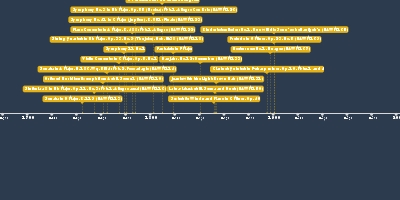1 Jan 1858 Jahr - Tristan und Isolde: Prelude and Conclusion of Act I (NAWM 149)
Beschreibung:
Composer: Richard WagnerGenre: Opera
Based on a 1200 romance by Gottfried von Strassburg, Wagner wrote his own libretto for Tristand und Isolde. Initially the opera was too novel and complex for most audience members, but, through subsequent performances, it came to be regarded as on the most important and influential operas ever written.
Act 1
Tristan (knight) is bringing Isolde (daughter of the Irish king) on a ship to Cornwall to marry his uncle King Marke. She’s in love with Tristan but he has offended her, so she plans to poison them both before they reach Cornwall. Her friend Brangane substituted a love potion for the poison, and Tristan and Isolde fell in love immediately. They are so distracted by each other they don’t realize they’ve arrived in Cornwall.
Act 2
They sneak around even though she’s married to Marke (embracing in passionate love), but they’re discovered and Tristan is wounded and betrayed by Melot (another knight).
Act 3
Tristan lies dying at his castle in Brittany. She arrives, but he dies in her arms. Second ship appears with Marke, Brangane, Melot, and other knights, and Kurwenal resists their entrance, kills Melot, and is slain in turn. Having learned of the love potion, Marke has come to release Isolde and allow her to wed Tristan, and he laments that his arrival brings only death. Isolde, unaware of all this, sinks unconscious on Tristan’s body and dies beside him.
Music Innovations
The music is not divided into numbers as earlier operas were, but rather continuously follows the action of the drama through each act. Additionally, much of the music is woven from leitmotifs (leading motives) associated with particular things or ideas through the texts or situations in which they appear. The vocal lines are nearly entirely syllabic, showing how important the text had become. Finally, due to the large orchestra, Wagner needed more powerful singers whose voices would not be drowned out (a heldentenor [hero-tenor] and a dramatic soprano).
Prelude
Instrumentally introduces many motives that will be used later, some of which will come to represent multiple things while others will be more singularly focused. The prelude also introduces the opera's main idea of a desire so intense that it can be fulfilled only in death. It does so through melodies that never reach a cadence and harmony that points to its resolution but never resolves (A minor tonic never appears in the prelude). The first chord (F-B-D#-G#) operates almost as a motif in its own right, so distinctive that it has earned the name the “Tristan Chord”.
Zugefügt zum Band der Zeit:
Datum:
1 Jan 1858 Jahr
Jetzt
~ 167 years ago
